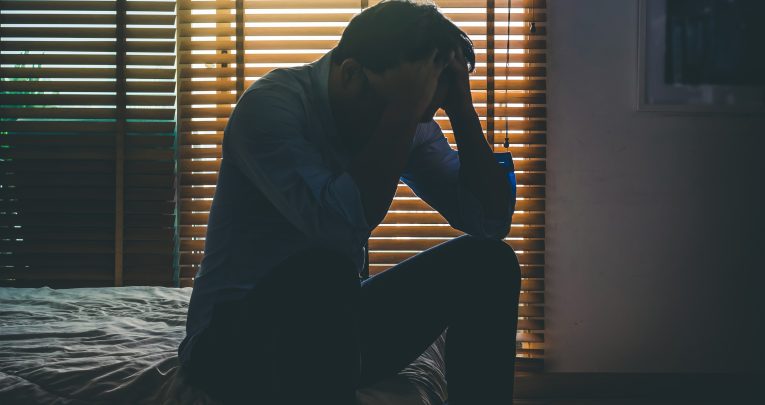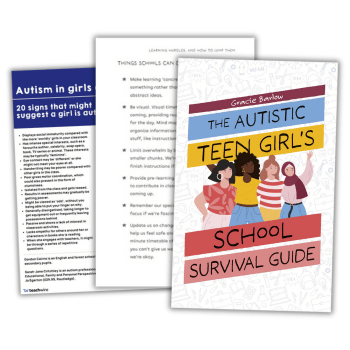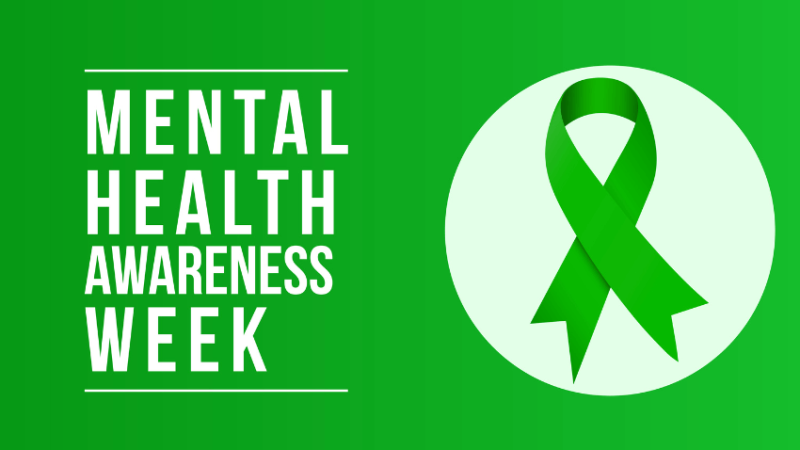Ian Eagleton – “I collapsed on the driveway and sobbed”

How one teacher changed the way he worked to better protect his mental health…

- by Ian Eagleton

Ian Eagleton discusses what it’s like to have a mental health crisis when you’re a teacher…
At secondary school I was bullied. I was pushed and shoved every day, sneered at, laughed at, whispered about, made fun of, called ‘gay’ and ‘disgusting’. I was spat at, kicked, poked and prodded and had things thrown at me.
Friends that I’d had in the first few weeks left me, ignored me or turned on me. One boy would constantly follow me around the school, lightly kicking the backs of my feet – not enough so I would fall over in front of an adult, but enough for me to know he was there, watching and waiting, an ominous presence.
And every day, the same group of boys would whisper my name in a mocking, drawn out, effeminate imitation of my voice: ‘Iaaannnnn.’ They did this in the classroom, in the corridors, in the playground, at lunch, in the toilets, at the bus stop.
This happened to me from the age of 11 until I was 18. It was a brutal, calculated onslaught that aimed to degrade me and make me feel worthless. It worked and is still very difficult to talk about.
Transported
I often sat in the toilets or in the library at break and lunch and read on my own, transported through the wonder of words to another place, and hoped that one day I’d be able to feel safe.
I struck up a friendship with another boy who suffered the same treatment and we clung together, praying for it to end. I’ll always be grateful to him for his relentless support during that time.
When I told the teachers, no one believed me or seemed to care. One teacher told me to ‘just ignore it’. I was too ashamed to tell my parents – it would mean telling them why this was happening to me. Every day I wondered where the next attack might come from and why they were doing this. I was very, very scared.
Maybe I wasn’t a very good person and deserved it? Was it because I was fat? Was it because I was quiet and not very good at football? Should I change? Maybe if I worked harder and did well, did better than everyone else, they’d leave me alone?
Better, smarter, stronger
So I did. I wrote brilliant, thoughtful essays. I went to a maths tutor every Saturday to make sure I got an A in my GCSEs and joined the rugby team. Swimming for my school and painting the scenery for the school plays was also squeezed in.
Every day I tried to be better, smarter, stronger. Surely, that way, someone would like me? Surely, surely they’d leave me alone? But they didn’t. In fact, they hated me even more.
I still turned up every day, propelled by an insatiable need to do better, to be better, but by the time I was 18, I was a nervous, isolated, broken mess. I pushed aside my feelings, refused to tell anyone and tried desperately to forget it ever happened.
A proposal
Fast forward to two and a half years ago. I was standing on top of the Empire State Building on the evening of my 30th birthday with my brilliant partner and he asked me to marry him.
“Yes!”, I remember thinking. I wanted to scream out loud and tap strangers on the shoulder to tell them. But suddenly a darkness surrounded me.
I completely shut down and realised that something was not quite right. Feeling very sweaty, sick, out of breath, unsafe and dizzy, I wanted to run away. A voice kept saying to me, “Don’t do it! It’s not safe! Go and be on your own. You know what happens…”
But I was used to all of these feelings. For as long as I can remember I have felt panicked and tired every day, a by-product of my school days, always alert to any perceived danger.
Chest infection
From September 2014 until May 2015, it was especially bad and I had a constant, hacking chest infection. I went to the doctors almost every month to try new antibiotics. Nothing worked.
Of course, if anyone asked, I said that I was a ‘bit down’ and that it was this constant cough that was making me feel terrible.
My headteacher would pop in at the end of the day, looking worried, and ask if I needed a few days off. I’d say, ‘I’m fine! It’s this cold – I just can’t get rid of it!’ And honestly, I thought it was just a cold.
I spent the rest of my New York holiday in a fug. My partner had just asked me to marry him, but I didn’t feel right. Not at all. What was wrong with me?
Collapsed
On the drive back from the airport, I asked if we could stop off at my parents, just to say hello. When we arrived, I got out of the car, collapsed on the driveway and sobbed.
The force of my anger, fear and shame was frightening. I lay in a curled heap and screamed, kicked, shouted and cried and cried. I was utterly inconsolable.
Much to my horror, I was taken to hospital. Later, back at my parents’ house, I retreated under the duvet, but the very next day the teacher in me kicked in. I staggered downstairs to a room of concerned faces and said, ‘I need to get to school.’
Mum replied, ‘I’ve rung and told them you won’t be in for a while. Your head says it’s not a problem. She’s booking cover for the rest of the half term. You’re not well, Ian.’
I have never been so angry in my life. What had been said about me? Would I lose my job? The children needed me. I stomped back upstairs, cried and fell asleep.
Later that night Mum shuffled in, looking sheepish. ‘I know you’re cross with me,’ she said, ‘but you can’t go to work, Ian. You’re no good to the children like this. Everyone understands.’
Done in
It was then that I said the three words that will probably stay with me for the rest of my life: ‘I’m done in.’ I wept and Mum held me and said exactly what I needed to hear: ‘It’s OK to be done in for now. You’ve been working very hard. Have a rest. You’re allowed.’
How did I get to this point? Thirty years old and completely done in. Was it my fault? I wanted to be a teacher so I studied and studied. When I wanted to be an English co-ordinator I worked and worked. I wanted to be on SLT, so I made it happen.
When I marked books, I wrote almost as much as the children had. I sat through meeting after meeting. Once I replied to emails on the top of a mountain in the Lake District on a bank holiday. Ignoring my partner while I planned my next week of lessons was normal, as was running staff meetings.
Sitting in the study at home on the most beautiful sunny day, I watched my partner in the garden while I wrote reports.
I’d find myself yawning my way through drinks with friends, thinking about the children in my class. Were they OK? Were they happy? Often I woke up in the middle of the night, screaming and sweating.
Refusing help
I refused to let anyone help or take on any of the jobs I was doing. I could have said no – after all, no one was telling me to do all this. My head always trusted my judgement and supported me. No one was on my back chasing me. But I was still driven by constantly wanting to do better and be better.
I can’t blame my breakdown on my job or stress. I’d like to be able to do that – it would be much easier. It was a factor that added to it, but it doesn’t quite answer the question of why I felt I had to work so hard, be better and keep up a façade of respectable efficiency.
It was the strategies that I had put in place all those years ago to survive during secondary school that had finally failed and were crippling me. They required too much energy and vigilance. I was utterly lost.
Trending
However, I’m happy to say it didn’t end there. I gradually got better. Having the decision taken away from me about returning to work, and knowing that the teacher covering me was doing a wonderful job, meant that I could forget about school for a bit.
Back in school
I saw a counsellor every week and still do. I slept and cried and slowly got my strength back. Some days were horrendous, but other days were a bit better.
And so it was in July 2015 that I found myself back in school. My head suggested that I just came in for ten minutes, just to say hello, since there was still a teacher covering my class. Of course, I was planning on teaching for the whole day, but I only managed the register then went home and slept for two days.
At the end of the week I went in again and ran a game in maths for fifteen minutes. It was rubbish and I was very rusty, but the children were pleased to see me.
And so it went on. Thirty minutes became a lesson. A lesson became a morning. And a morning became a day. By the end of July, I was almost back to working full time. However, I was still exhausted.
Needed to change
That’s when I knew that the old way wasn’t working for me anymore. I needed to change to ensure I never felt like this again. My new strategies don’t involve placing myself under such extreme pressure to prove something.
Some of the changes I initially made on my road to recovery didn’t work. For a long time, I avoided the staffroom – it was too noisy and chaotic and I was worried people would ask questions about where I had been.
I also struggled to follow conversations. I’d often sit in my room, alone, eating lunch and staring into space. I cut myself off from the everyday hubbub of school life, marked books and went home. At the time, it was something I needed to do.
Gradually I have begun to spend more time in the staffroom and have begun to enjoy spending time with my colleagues again – it is over these informal chats and jokes that so much information is shared, that I learn about my fellow members of staff and have discovered that we are actually all in the same boat.
Open
I’m now quite open about why I was off for such a long period of time and know that sharing a cup of tea with colleagues often leads to excellent sharing of practice and resources and, more importantly, the sharing of laughter and life.
My creativity was certainly negatively affected by my illness, at least at first. I could barely remember what had happened on the page I was reading or what someone had asked me just a few minutes before, let alone all the concepts, facts, figures and knowledge I was expected to impart to my children.
For a long time I relied on pre-planned schemes and ready-made resources in a bid to save time and support me as I began to teach.
These certainly have their place and I would never disparage them or tell people not to use resources and plans made by someone else – I was very glad of having them and having the pressure taken off me to deliver an exciting, all-singing, all-dancing lesson.
However, as I continued to regain confidence (which took about a year and a half) I found that I no longer relied on schemes of learning and pre-packaged resources as much. I began experimenting more with the content of my lessons and how I delivered them.
Finding inspiration
Twitter has been a great source of information and there are many brilliant practitioners that I follow who often give me inspiration, lesson ideas and recommend books and films that might link in with a new topic so that I can enliven my teaching and engage my children.
I now spend a lot more time reading articles about areas of interest, such as EYFS, whole class reading and the use of pictures and films to inspire writing.
I’m also now strict about scheduling in time for myself. Tuesday evening is weight-lifting. Sunday evening is a roast dinner with the family. I listen to podcasts in the bath and read before I go to bed. We try and put our phones to one side while we watch a film. If school work isn’t done, it waits.
I often choose to spend my lunchtimes marking books and try and give as much verbal feedback in each lesson as I physically can, in order to reduce my workload.
Subject leader
As a subject leader, when I am planning my priorities for the year, I think carefully about what will have the most impact, how I can introduce new initiatives to staff and how I can monitor them without placing my colleagues under any more stress or pressure.
I’m so glad that I didn’t give up and that I got back into the classroom. My approach to my profession is different now. I’m trying to be more relaxed. Every day I work on new ways to be more efficient, effective and productive without buckling under the pressure I place on myself.
This journey has led to me becoming stronger and taking some risks, such as doing some freelance consultancy, accepting invitations to talk at conferences and writing articles. I don’t need to please other people or work for companies that don’t value me. I’m happy to tell people about my experiences and how they inform my practice.
I feel lucky that I am asked by my class to read to them every day. That I got to help them write amazing stories. That I get to see them master new concepts and hear about their everyday triumphs.
The other day I beamed as I watched a group of boys and girls swooping around the frosty playground being superheroes, their coats becoming makeshift capes.
Another chance
I’m lucky that, through the support of my partner, parents, family, friends, colleagues, deputy and headteacher I got another chance to teach.
If you’re feeling like I did, don’t give up. I still have bad days. It will get better. It’s a long journey – an unexpected journey that I never thought I would go on. Sometimes, as cliched as it sounds, you really do need to hit rock bottom to help you see what you have, what you need and what’s important.
Working in education is not easy but there are approaches we can employ to ensure that our family, friends, wellbeing and happiness can coexist and thrive alongside the job so many of us love.
Institutionalised homophobia and bullying is not OK. Using ‘gay’ as an adjective to describe something ‘uncool’ is not OK. It is an unacceptable form of discrimination. To underestimate the effect of this type of bullying is truly catastrophic. For too long, I pretended that it didn’t happen, and look at the impact it had.
You’re allowed
Recently, after five years of being together, I was finally able to explain to my partner what had happened to me and why I get so nervous about new things, why I struggle with change.
And for those of you that need to hear it, I will repeat what my wonderful mum said to me: ‘It’s OK to be done in for now. You’ve been working very hard. Have a rest. You’re allowed.’
The importance of those two words – ‘for now’ – have stayed with me and cannot be underestimated. Mum knew that it was temporary; that I could and would get better; that somewhere in me I had the strength to rebuild myself.
On a final note, after feeling like my panic attack on the Empire State Building and subsequent breakdown rather took the shine off our engagement, I asked my partner to marry me again a year later. He said yes.
Ian Eagleton is a primary school teacher, currently teaching Year 2, and an education consultant. You can follow him on Twitter at @MrEagletonIan. This blog post was in response to a teacher mental health survey we ran in conjunction with Leeds Beckett University. Browse World Mental Health Day activities.










